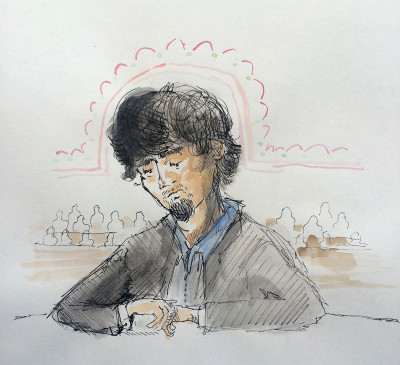
While currently serving time in a maximum security federal prison in Florence, Colorado, convicted Boston Marathon bomber Dzhokhar Tsarnaev looks to have a new day in court to challenge his death sentence.
The 22-year-old, who would have graduated from the University of Massachusetts Dartmouth in May, instead saw the end of a two month trial that resulted in conviction on 30 counts and later the death penalty on six of the 17 counts that carried it, The Daily Free Press reported.
Back at the John Joseph Moakley United States Courthouse Tuesday, U.S. District Court Judge George O’Toole heard three motions, which dealt with reconsidering the counts against Tsarnaev in a new legal context, access to firewalled information and restitution for victims, the FreeP reported Wednesday.
Rosanna Cavallaro, a professor at the Suffolk University Law School, said the fact that Tsarnaev was given a hearing is telling of the law system in the United States.
“In our system, even as someone who is reviled, someone who we think is horrible, who has admitted to the crime, is still going to get a lot of process, [and] a lot of very careful consideration of whether the way we’ve decided that they’re guilty is a fair way,” Cavallaro said. “We’re going to have another court here for the third time, for the same question.”
Within two weeks of his sentencing hearing, attorneys for Tsarnaev filed a “placeholder” motion for an appeal, the FreeP reported July 8.
“The government failed to prove each and every element of each and every charged offense beyond a reasonable doubt, and failed to prove each and every fact required to warrant the death penalty beyond a reasonable doubt,” the complete motion from Aug. 17 states. “In the alternative, the Court should order a new trial as to both guilt and/or penalty in the interests of justice, and the trial should be held in a different venue.”
In a Sept. 30 motion, the prosecution opposed Tsarnaev’s request to change the venue of the new trial, citing that Tsarnaev had no evidence that the jury was affected by factors like press coverage and social media.
Motions to change the court location of the trial were also denied by O’Toole.
Jack Greene, a professor of criminal justice at Northeastern University, said due to the ongoing media coverage, finding unbiased jurors would have been difficult.
“Certain events get so much media coverage that it’s almost impossible to find people who might not know about the case,” Greene said. “So major cases like [this] it’s hard to find people in other parts of the country or Massachusetts that weren’t aware of the fact that there was a bombing event.”
Changing the venue of the trial, Greene said, would not have had a significant impact on the outcome of the trial because “people will be prejudiced.”
David Rossman, director of criminal law clinical programs at the Boston University School of Law, said the probability of a successful appeal for Tsarnaev is low.
“Since all of these claims were already presented to the trial judge before the trial began, the prospect of success is very slim,” Rossman wrote in an email. “Only about 10 percent of federal convictions succeed.”
The ruling for the appeal at the federal level will take about one year, Rossman said, adding that it is unlikely any judge will alter any decision that has already been made.
Cavallaro said a lawyer’s decision to advocate for an appeal is commonly observed in a court of law regardless of the likelihood of success.
“It’s what we call zealous advocacy. [Lawyers] exercise every option, they try everything,” Cavallaro said. “Even if it’s not likely at all to be useful, they still do it. So I think the lawyers know that there’s virtually zero chance that they will win on this motion, but they will still argue it as zealously as they know how.”
Several residents said relocating to a different city would not have a significant impact on the outcome of the trial.
Joe Conley, 29, of West Roxbury, said although it is common for a lawyer to make a case for an appeal, it is not appropriate in this case.
“The capacity exists for [Tsarnaev] to be appropriately judged in the city,” he said. “It’s the defense attorney’s job to argue it, but I don’t think that ultimately it’s correct.”
Hannah Mecaskey, 27, of West Roxbury, shared a personal perspective on Tsarnaev’s impact on the city of Boston.
“One of our friends was running the marathon that day,” she said. “She wasn’t hurt, but I think that a lot of people thought a lot about doing long distance runs, and it definitely impacted people as to whether or not they would do these runs. There’s been a big rally for more safety.”
Dominic DiLuzio, 30, of Jamaica Plain, said he does not think that moving the trial to a different location would have made a difference in the verdict.
“I don’t think it has anything to do with the guilty verdict,” he said. “We know who did it. It just comes down to what the punishment would be in the end, but overall we know he did it. So I guess it’s just a matter of getting a punishment that [the lawyers] are comfortable with.”



















































































































annette • Dec 5, 2015 at 3:45 am
that article is so wrong the trial should not have been in boston and it was not a fair trial and no we don’t know who did it because i know for damn sure it was not dzhokhar as he or tamerlan was not even there that day…everyone is so fast to jump to the conclusion yep the media and govt says he did it so he must be guilty well obama also said we have no reason to worry about isis in america well guess what the people of san bernardino didn’t get that message i guess